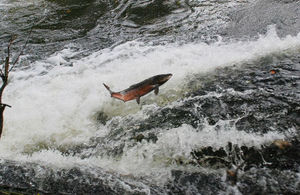Worm bait returns for trial period at Exmoor fishery
Catch and release restriction remains at Watersmeet and Glenthorne Fishery as salmon numbers are still low after disease.

To boost salmon numbers, the catch-and-release restriction has to remain
The Environment Agency is continuing conservation measures on its Watersmeet and Glenthorne Fishery for the coming season.
Restrictions have been in place on this popular Exmoor fishery since 2014 in response to disease problems affecting adult salmon and sea trout returning to the East Lyn to spawn. Recent monitoring also revealed reduced numbers of young salmon.
Anglers have been allowed to continue fishing for salmon and sea trout on a ‘catch and release’ basis throughout the season and have been limited to fishing with a fly or spinner only. The use of worms was traditionally allowed from 16 June. However, this method of fishing can be very effective and has been prohibited in recent years to limit the number of fish caught while stocks have been under pressure.
Following discussions with the Lyn Riparian Owners Association and local interest groups, worming is being allowed again on a trial basis this year from 16 June, subject to strict conditions.
Worms will only be allowed when fished on a single circle-patterned hook, no larger than Size 4. A circle hook increases the likelihood a fish is hooked in the jaw where it can be safely removed. This type of hook reduces the risk of ‘deep hooking’ which can sometimes occur when worming. It also reduces the chances of accidentally catching trout and salmon parr on this method.
All salmon and sea trout must still be released throughout the 2017 season, irrespective of the method used to catch them. As a further conservation measure, anglers will not be allowed to fish with worm at any time in Long Pool.
Mike Holland of the Environment Agency said:
We want fishermen to continue to enjoy their sport on the Watersmeet and Glenthorne Fishery, but at the same time ensure suitable measures are in place to safeguard migratory fish returning to the river to spawn.
By allowing only circle hooks to be used for worming we hope to maximise the survival chances of any salmon and sea trout caught and released by this method. We’ll review the success of this trial at the end of the season.
The brown trout fishery regulations remain unchanged. The full list of fishery regulations can be found printed on the reverse of the permits, purchasable from local agents.